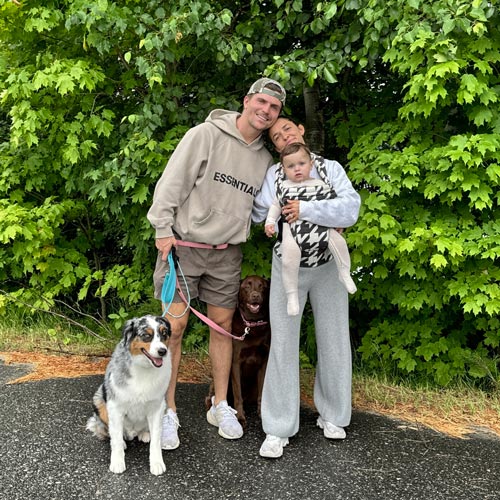
Jordan's Story
Jordan shares how meeting his wife and launching a wellness platform helped him recover from depression brought upon by lyme disease and a brain injury.

Jordan shares how meeting his wife and launching a wellness platform helped him recover from depression brought upon by lyme disease and a brain injury.
I began to see a future where I could be a husband, a father, and a person capable of love and connection again.
 About Jordan:
About Jordan:
I’m Jordan Dunin, the founder of HatchPath, a marketplace connecting individuals with wellness-related coaching, from mental health to nutrition and spirituality. My journey to creating HatchPath is deeply personal, rooted in overcoming significant health challenges. In 2016, I suffered a traumatic brain injury from diving into a lake, leading to chronic neck pain and emotional trauma. The following year, I was diagnosed with chronic Lyme disease, which forced me to withdraw from university during my final year. These experiences plunged me into deep depression and isolation.
This year, I completed a 70.3 Ironman. Today, I’m dedicated to helping others find their path to wellness through HatchPath, turning my pain into a purpose that drives me to support those facing similar struggles.
The major turning point in my recovery from depression came when I met my wife, Lauren. Before meeting her, I was trapped in a cycle of negativity, anger, and hopelessness. I had isolated myself from society, and the physical pain from my traumatic brain injury and chronic Lyme disease only deepened my emotional suffering. Waking up every day felt like a burden, and I struggled to find any reason to keep going.
Meeting Lauren changed everything. I began to see a future where I could be a husband, a father, and a person capable of love and connection again.
Lauren’s presence gave me the motivation I needed to start making changes in my life. I began to take small steps towards recovery, focusing on healing not just my body, but my mind and spirit as well. This shift in perspective was crucial—it helped me move from a place of despair to one of hope. Over time, I started to rebuild my life, and with Lauren by my side, I found the strength to push through the hardest days.
Take an inventory of your life and focus on what you’re grateful for. Find something that gives you a burning desire, and make it your mission. Helping others can be incredibly therapeutic and is one of the most selfless yet rewarding things you can do. Remember that life isn’t about waking up happy every day; it’s about creating value and joy for others and finding purpose in your actions.
– Jordan Dunin, Naples, Florida, USA ![]()
Too many men suffer in silence. Become a peer supporter for the men in your life.
In this four-part course (15–20 min each), you’ll learn what effective peer support looks like, how to show up for others, and how to stay grounded while doing so.